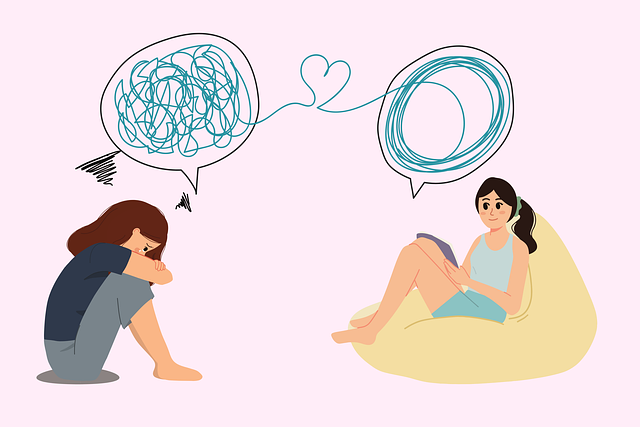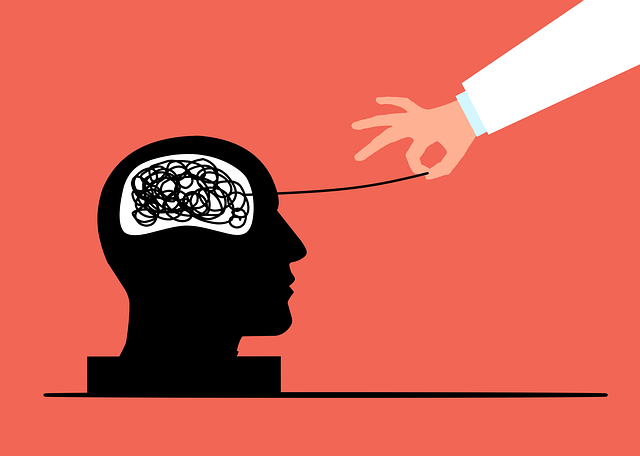Anxiety among children and teenagers is a widespread issue, driven by various factors like genetics, life events, and pressure from peers or academics. Cognitive-behavioral therapy (CBT) and mindfulness meditation are effective tools to manage anxiety, teaching coping strategies and emotional regulation. For kids in polyamorous or open relationships, therapists must employ culturally sensitive practices to address unique challenges, including jealousy and societal stigma. Self-care strategies like Mental Wellness Journaling, mindfulness, and creative outlets enhance mental well-being, reducing anxiety symptoms. Tailored therapy for these families is crucial to foster secure attachments and healthy relationship patterns, ultimately helping them thrive.
Anxiety is a prevalent concern among children, teens, and adults alike, with unique manifestations in various relationship types, including polyamorous and open relationships. This article explores comprehensive anxiety management techniques. We delve into understanding anxiety’s symptoms and causes specifically affecting youth, offering insights into tailored therapy approaches for polyamorous and open relationships. Additionally, practical self-care strategies are presented for daily anxiety mitigation, promoting holistic well-being.
- Understanding Anxiety in Children and Teens: Symptoms and Causes
- Unique Approaches to Therapy for Polyamorous and Open Relationships
- Practical Self-Care Strategies for Daily Anxiety Management
Understanding Anxiety in Children and Teens: Symptoms and Causes

Anxiety is a common struggle among children and teens, often manifesting as feelings of fear, worry, or restlessness. Understanding this condition in younger individuals is crucial for effective management and support. The symptoms can vary but may include excessive worrying, difficulty concentrating, physical manifestations like headaches or stomach aches, avoidance behaviors, and even sleep disturbances. These issues might stem from various causes, such as genetic predisposition, life events (including trauma), peer pressure, academic expectations, or changes in routines.
In addressing anxiety, therapy plays a pivotal role. For instance, cognitive-behavioral therapy (CBT) is widely recognized for its effectiveness in teaching children and teens coping strategies. This approach helps them identify and challenge negative thought patterns. Additionally, mindfulness meditation has gained traction as a complementary practice, fostering self-awareness exercises that promote relaxation and emotional regulation. The concept of polyamorous and open relationships may also be relevant in certain contexts, providing alternative support systems and fostering healthy communication about emotions and concerns. Furthermore, Mental Health Policy Analysis and Advocacy highlight the importance of community resources and accessible services to ensure children and teens receive the necessary care.
Unique Approaches to Therapy for Polyamorous and Open Relationships

In the realm of therapy for children within polyamorous and open relationships, unique approaches are needed to address the specific challenges these families face. Traditional therapy models may not always resonate with non-monogamous dynamics, highlighting the importance of culturally sensitive practices. Mental wellness is paramount in these arrangements, requiring therapists to foster environments that promote understanding and acceptance. This involves tailoring coping skills development to navigate potential jealousy issues, communication barriers, and societal stigma.
The key lies in incorporating approaches that respect the family’s structure while teaching effective strategies for emotional regulation and conflict resolution. With cultural sensitivity in mental healthcare practice as a guiding principle, therapists can help children and their polyamorous or open-minded parents thrive by fostering secure attachments and healthy relationship patterns.
Practical Self-Care Strategies for Daily Anxiety Management

Anxiety management doesn’t have to be complex; practical self-care strategies can significantly improve daily well-being. Incorporating simple yet effective techniques into your routine can help mitigate anxiety symptoms and foster emotional resilience. One powerful tool for both children and adults is therapy, with specialized approaches like those tailored for polyamorous and open relationships addressing unique challenges within these dynamics.
Self-care practices such as Mental Wellness Journaling Exercise Guidance have shown remarkable benefits in regulating emotions and promoting mental clarity. Dedicating just a few minutes each day to jot down thoughts and feelings can serve as an outlet for processing stress and anxiety. Additionally, emotional healing processes like mindfulness meditation or engaging in creative outlets like art or music can provide much-needed respite from anxious thoughts, helping individuals regain a sense of calm and control over their lives.
Anxiety management is a multifaceted approach, especially considering the diverse nature of human relationships. For parents navigating anxiety in children and teens, recognizing symptoms and understanding causes is the first step towards effective support. In the context of polyamorous and open relationships, unique therapeutic methods can foster resilience and well-being. Incorporating practical self-care strategies into daily routines provides everyone with tools to manage anxiety, promoting a healthier and more balanced lifestyle. By combining these techniques, individuals and families can actively pursue vibrant lives while managing anxiety along the way.








